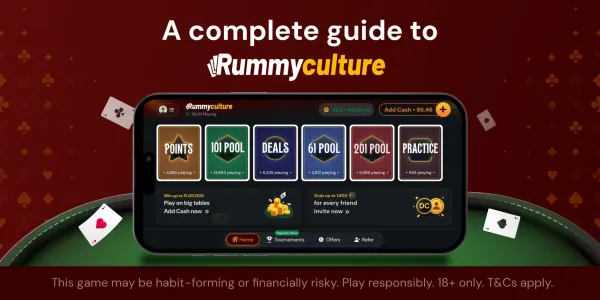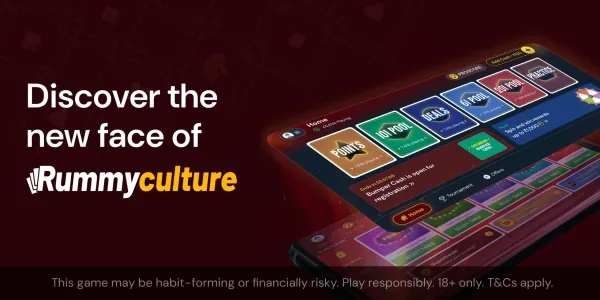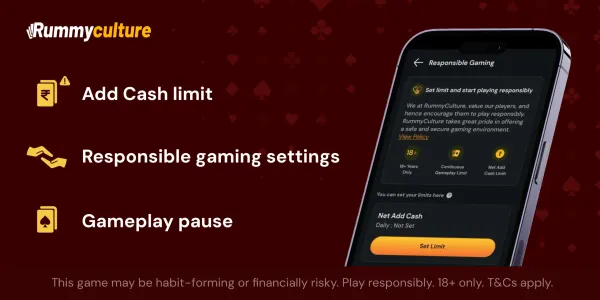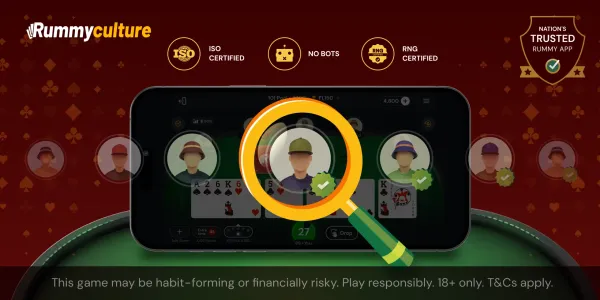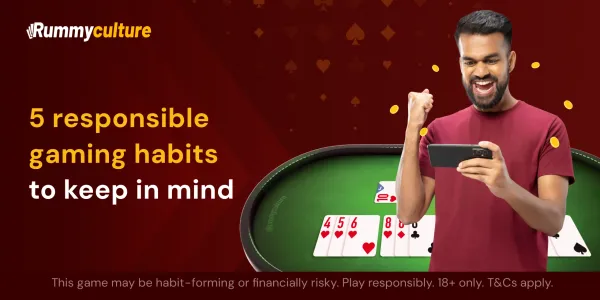- Home
- What's the Buzz
- Life skills you can master by playing rummy
Life skills you can master by playing rummy
Rummy as a game is filled with ups and downs, highs and lows; much like life itself.
RummyCulture Elite Editors | 11th Nov, 2024
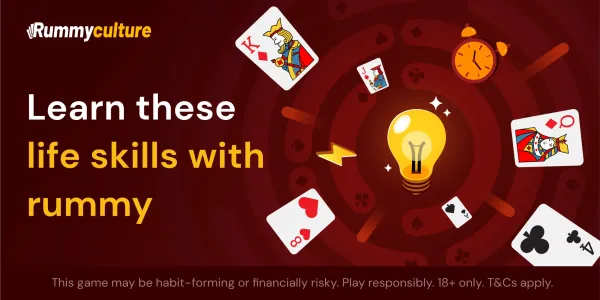
Life skills you can master by playing rummy
They say art imitates life, and so does a game of rummy.
Rummy is an exciting game that offers fun challenges to every player. Every format brings with it different kinds of opportunities. Some formats are fast and short, making players become quick with their moves, while longer formats improve skills like patience and planning ahead. Sometimes you could be dealt the best hand, but a small miss can cost you the game, and sometimes you emerge victorious even with a not-so-great hand. Rummy as a game is filled with ups and downs, highs and lows; much like life itself.
In this blog, we will discuss how players can benefit from playing rummy in real life as well.
Rummy requires a combination of skills
Playing online rummy is a great way to build some critical skills needed in life. The thrill and the adrenaline rush make rummy a very exciting game for players, and the skills used in rummy are largely transferable for real-world situations:
- Practice makes perfect
- Strategic thinking and probability assessment
- Faster decision-making, as rummy is a timed game
- Thinking ahead and adapting to different situations
- Learning when to “drop” and let go
Practice is the name of the game
Rummy is a game of skills, and skills can be honed. We always urge our players to play practice games before starting with cash games, and isn’t life a bit like that too? When we are young, we are constantly on a learning curve; collecting lessons, successes, and failures but growing with every experience. Mastering any skill requires consistency. The reason most pros will win over a new player despite not having a great set of cards is because they know how to deal with any situation and make the best of it.
Strategic thinking and probability assessment
Rummy isn’t just played with the cards you are dealt; most of it is played by observing your opponents. Pro players always concentrate on their competition’s moves just as much as their own. They look, remember, and strategise accordingly.
Pro rummy players always keep track of the disposed cards and the cards picked up by the opponents. That way, they can gauge what kind of sequences and sets the opponents are making, helping them stay one step ahead in the game.
For example, if you see your opponent discard 2♥, 3♥ and K♥, it is a safe assumption that they are not looking at making:
A♥K♥Q♥ or
A♥2♥3♥ or
2♥3♥4♥
So, you can discard A♥ which is a high-ranking card (reducing your total points) and would be unusable to your opponent.
This is an especially important skill to have in leadership positions, because whether you’re working for a company or playing rummy, knowing your competition is the first step to beating them. Every move of yours must be thought through.
Faster decision-making and time management
Rummy is a timed game. While in real life you will usually get more than 30 seconds to make an important decision, playing rummy helps you sharpen this skill by prompting you to make the best decision in a limited time period. Initially, a player may see the fleeting seconds and panic, but with enough practice, you will no longer worry about the timer. You are more focused on what to do, rather than how long you have for it. You learn to manage your time effectively and even think ahead.
Thinking ahead and adapting
Seasoned players tend to plan a few moves ahead. The more one practices, the better one gets at anticipating the best moves for the best possible outcome. This also entails switching your strategy in case things change in unexpected ways.
Suppose you waited a lot for A ♠ to complete your sequence, and you see the 2nd player to your left discarding one. But you can’t pick it, because it is not your turn. You can either feel dejected by it or plan your next move. You will need to come up with alternatives: if it’s not A ♠ 2 ♠ 3 ♠, can it be 2 ♠ 3 ♠ 4 ♠? If you don’t get your 4 ♠ soon, how many penalty points will you be left with?
Adapting to unfortunate circumstances is a life skill every person should have. Life is unpredictable, sometimes you just can’t seem to get the cards you want. That doesn’t mean you are losing, that just means you need to redirect.
Learning when to “drop” and let go
Seasoned players know that a first drop is a strategic move to cut down on potential losses. They see their hand, think of a strategy, and if they don’t feel confident enough they don’t drag their game on. They understand that losing one small battle doesn’t mean losing the war, and they can gear up for their next game instead. In real life too, it is important to know when to “drop out” of a situation. Dropping isn’t a bad thing; it just means you don’t want to keep playing with the cards you’ve been dealt.
Similarly, it is always advisable to discard unusable high-value cards as early as possible to reduce losses. Just because they are high-value, does not mean they are useful to a player. Letting go of these cards helps reduce your points in a rummy game in case of a loss. One must always be prepared for the worst-case scenario and plan accordingly.
Also Read: What to do if you are losing too many games?
Don’t forget to keep enjoying the game!
While it is quite a journey, learning to play rummy is a process that is filled with excitement and thrills. Players should always remember the purpose of gaming; having fun. Even in life, it is important to take a step back to cherish and enjoy the journey, because unlike PowerPlay at RummyCulture you don’t get multiple rejoins here.
Featured articles


